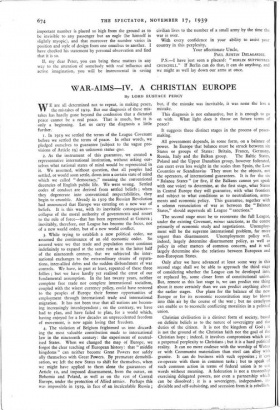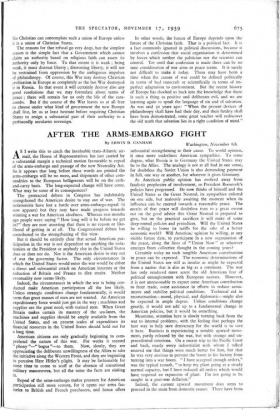WAR-AIMS IV. A CHRISTIAN EUROPE
By LORD EUSTACE PERCY
WE are all determined not to repeat, in making peace, the mistakes of 1919. But our diagnosis of these mis- takes has hardly gone beyond the confession that a dictated peace cannot be a real peace. That is much, but it is only a beginning. Let us carry the diagnosis a little further.
I. In 1919 we settled the terms of the League Covenant before we settled the terms of peace. In other words, we pledged ourselves to guarantee (subject to the vague pro- visions of Article 19) an unknown status quo.
2. As the instrument of this guarantee, we created a representative international institution, without asking our- selves what national states of mind would be represented in it. We assumed, without question, that all peoples had settled, or would soon settle, down into a certain state of mind which we called " democracy," meaning the conventional decencies of English public life. We were wrong. Settled codes of conduct are derived from settled beliefs ; when they degenerate into conventional respectabilities, they begin to crumble. Already in 1919 the Russian Revolution had announced that Europe was entering on a new war of beliefs. It is this war, with its inevitable consequences— collapse of the moral authority of governments and resort to the rule of force—that has been represented at Geneva ; inevitably, therefore, our League has become the focus, not of a new world order, but of a new world conflict.
3. While trying to establish a new political order, we assumed the continuance of an old economic order. So assured were we that trade and population must continue indefinitely to expand at the same rate as in the latter half of the nineteenth century, that we subjected the inter- national exchanges to the extraordinary strains of repara- tions, inter-allied debts and the sudden disbandment of war controls. We have, in part at least, repented of these three follies ; but we have hardly yet realised the error of our fundamental assumption. In the last twenty years, neither complete free trade nor complete international socialism, coupled with the wisest currency policy, could have restored to the peoples of Europe their former opportunities of employment through international trade and international migration. It has not been true that all nations are becom- ing increasingly interdependent ; on the contrary, we have had to plan, and have failed to plan, for a world which, having enjoyed for a few decades an unprecedented freedom of movement, is now again losing that freedom.
4. The violation of Belgium frightened us into discard- ing the most valuable contribution made to international law in the nineteenth century: the experiment of neutral- ised States. When we changed the map of Europe, we forgot the clear teaching of European history: that " middle kingdoms " can neither become Great Powers nor safely ally themselves with Great Powers. By premature demobili- sation, we left the new States to shift for themselves, when we might have applied to them alone the guarantees of Article to, and imposed disarmament, from the outset, on Bohemia and Poland, as well as on the rest of Central Europe, under the protection of Allied armies. Perhaps this was impossible in 1919, in face of an incalculable Russia ; but, if the mistake was inevitable, it was none the less a mistake.
This diagnosis is not exhaustive, but it is enough to go on with. What light does it throw on future terms of peace?
It suggests three distinct stages in the process of peace- making.
All government depends, in some form, on a balance of power. In Europe that balance must be struck between six States or groups of States: Britain, France, Germany, Russia, Italy and the Balkan group. The Baltic States, Poland and the Upper Danubian group, however federated, can exert even less weight in the scales than Spain, the Low Countries or Scandinavia! They must be the objects, not the operators, of international guarantees. It is for the six " Balance States " (or five, if the Balkans cannot yet speak with one voice) to determine, at the first stage, what States in Central Europe they will guarantee, with what frontiers and subject to what conditions as to neutralisation, arma- ments and economic policy. This guarantee, together with a solemn renunciation of war as between the " Balance States," should supersede all League " sanctions."
The second stage must be to reconvene the full League, under the existing Covenant, minus sanctions, as the centre primarily of economic study and negotiations. Unemploy- ment will be the supreme international problem, far more urgent than disarmament. Unemployment policy will, indeed, largely determine disarmament policy, as well as policy in other matters of common concern, and it will largely determine also the relations between European and non-European States.
Only after we have advanced at least some way in this second stage shall we be able to approach the third stage of considering whether the League can be developed into, or replaced by, some closer form of constitutional union. But, remote as this last stage is, we can predict one thing about it more certainly than we can predict anything about the earlier stages. Our plans for the balance of the new Europe or for its economic reconstitution may be blown into thin air by the course of the war ; but no cataclysm can enable us to reconcile conflicting moralities in a political union.
Christian civilisation is a distinct form of society, based on definite beliefs as to the nature of sovereignty and the duties of the citizen. It is not the kingdom of God ; it is not the ground of the Christian faith nor the goal of the Christian hope ; indeed, it involves compromises which are a perpetual perplexity to Christians ; but it is a hard political reality. It can no more coalesce with the worship of Wotan or with Communist materialism than steel can alloy with granite. It can do business with such opposites ; it 'can co-operate with them in common tasks ; but to speak of such common action in terms of federal union is to use words without meaning. A federation is not a trusteeship exercising delegated powers, nor even a partnership which can be dissolved ; it is a sovereignty, independent, In- divisible and self-subsisting, and secession from it is rebellion. No Christian can contemplate such a union of Europe unless it is a union of Christian States.
The reasons for that refusal go very deep, but the simplest reason is the simple fact that a Government which cannot claim an authority based on religious faith can assert its authority only by force. To that extent it is weak ; being weak, it must distrust liberty ; distrusting liberty, it will not be restrained from oppression by the ambiguous impulses of philanthropy. Of course, this War may destroy Christian civilisation in Europe as completely as the last War destroyed it in Russia. In that event it will certainly destroy also any good resolutions that we may formulate about terms of peace ; there will remain for us only the life of the cata- combs. But if the course of the War leaves us at all free to choose under what kind of government the new Europe shall live, let us at least hesitate before requiring Christian States to resign a substantial part of their authority to a perforcedly secularist sovereign. In other words, the future of Europe depends upon the future of the Christian faith. That is a political fact. It is a fact commonly ignored in political discussions, because it involves a confession that social organisation is determined by forces which neither the politician nor the scientist can control. Yet until that confession is made there can he no sane consideration of war aims or peace terms. It is surely not difficult to make it today. There may have been a time when the causes of war could be defined politically in terms of bad statecraft or scientifically in terms of im- perfect adaptation to environment. But the recent history of Europe has shocked us back into the knowledge that there is such a thing as positive and deliberate evil, and we are learning again to speak the language of sin and of salvation. As was said 3o years ago: " When the present devices of philanthropy shall have had their day, and their futility shall have been demonstrated, some great teacher will rediscover the old truth that salvation lies in a right condition of mind."





































































 Previous page
Previous page